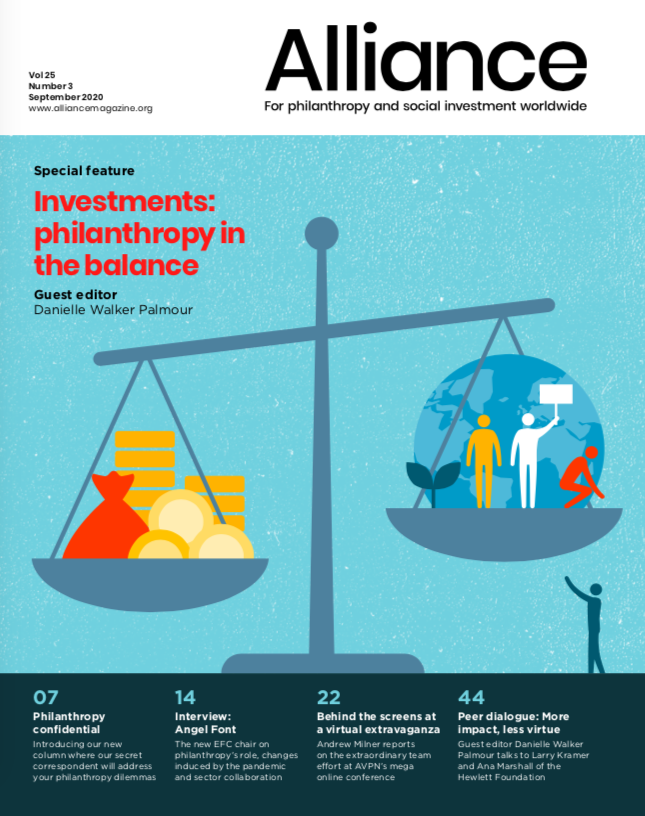The Covid-19 pandemic has shown that global problems need comprehensive solutions
The current pandemic has laid bare the fact that Latin American philanthropy can no longer ignore the need to concert its grantmaking and investment of its assets. The outbreak has crunched several pressing challenges and questions around development, highlighting the extent to which we all need to cooperate in order to solve global issues. Siloed action is no longer enough to achieve common goods.
From localised assistance to global concert
Historically, local philanthropy in Latin America has focused its grantmaking on pressing social issues such as poverty alleviation and access to basic services like health and education. Environmental issues are not yet widely championed and systemic views on the interrelation between social and environmental goals and dynamics are lacking. It is impossible to address local needs in a durable way without incorporating the understanding of how they relate to global challenges, including climate change. To effectively address these, collective efforts are required and that includes massive mobilisation of resources.
Philanthropy is now similarly under scrutiny and its legitimacy at stake as the whole of its assets, including endowments and investments, are considered as part of the impact they have in society.
Financial flows play a fundamental role in shaping global dynamics that in turn determine those dynamics at national and local levels. The Paris Agreement on climate change adopted in 2015, has, as one of its long-term goals, the aim of making financial flows consistent with a pathway towards low-greenhouse gas emissions and resilient development. Since then, and in light of the most recent scientific evidence, our collective goal must be to cut emissions by half each decade, and protect and restore natural ecosystems. The scale of the challenge and the exponential curve of damage we are facing, requires decisive action and solutions at the same scale.
What foundations can do
Philanthropic organisations must get on board quickly, and not just through grantmaking. Where the endowments are invested, or what the businesses which have provided the philanthropic money are doing, has only recently started to become a matter of active public debate. According to the Global Philanthropy Report, while over 90 per cent of foundations worldwide are independent, in Latin America in particular almost 50 per cent are corporate or semi-corporate. This trend is led mainly by Argentina (75 per cent), Colombia (69 per cent), Brazil (65 per cent) and Mexico (45 per cent) where many of the largest companies belong to carbon-intensive sectors like oil, gas, aviation and construction (cement production and infrastructure).Whether these investments are contributing to healing our planet and are aligned with the social and environmental purposes that guide their owners’ philanthropic grantmaking, needs to be a frequently asked question in boardrooms.
Foundations must define and disclose investment criteria for both grantmaking and endowments, in terms of how – or if – they promote planetary health, including climate.
The urgency of the situation means that the change needs to be accelerated. Corporations have been at the centre of this debate for decades, using corporate social responsibility as a means to address legitimacy concerns and companies’ social licence to operate. Philanthropy, usually understood as contributing to public interest and common good, is now similarly under scrutiny and its legitimacy at stake as the whole of its assets, including endowments and investments, are considered as part of the impact they have in society. In order to remain legitimate and effective, philanthropic organisations need to prioritise addressing global challenges in at least the following ways.
First, foundations must define and disclose investment criteria for both grantmaking and endowments, in terms of how – or if – they promote planetary health, including climate. Disclosure of climate related financial risks and opportunities following standards such as that of the Task Force on Climate-Related Financial Disclosures is fundamental. However, increased transparency is but the basis for action: excluding investments in high-emitting sectors is only one example of what all institutional investors, including philanthropy, should be doing. At the very least, foundations need to actively engage with the carbon-intensive companies they invest in so as to urge them towards the transition away from fossil fuels. Furthermore, through innovative approaches such as those found in blended finance, philanthropic actors may be able to provide catalytic capital to de-risk investments in low-carbon and resilience-building projects and sectors. Foundations must embrace their role not just as grantmakers, but as active capital market stakeholders.
Foundations should actively engage with their parent businesses to instigate systemic shifts in our entire economic architecture towards a sustainable, zero-emissions and resilient model.
Second, in grantmaking portfolios, it is critical that measures for success of a project include sustainability criteria, such as greenhouse gas emissions reductions and building resilience to climate change and future interrelated crises. Within each foundation’s mandate, boards should consider redirecting part or all of their grantmaking to actions that directly help solve the climate and planetary health emergency. Any improvements in education, infrastructure and health are doomed to be reversed if the natural systems cannot support them. There are no jobs, no food, no schools and no hospitals on an inhospitable planet.
Third, foundations should actively engage with their parent businesses Philanthropic resources may be helping save and improve lives, but if their parent businesses are systematically harming our society and planet, good deeds are cancelled out.
There is no time to lose. Our communities, economies and ecosystems are on the verge of seismic shifts which can easily go the wrong way. Philanthropy has a crucial role to play in directing our energy in the right direction, in order to deliver on every single philanthropic objective. Whether focusing on infant nutrition or elderly livelihoods, ecosystem restoration or peace-building, every single philanthropic mandate aims for a better world. How resources – all of them, grants, and also equity and debt portfolios – are invested will determine whether we achieve it or not.
For more on this topic check out Alliance’s climate commitment at alliancemagazine.org/climate
María-Laura Rojas is founder and executive director of Transforma, and senior adviser to the Colombian Climate Asset Disclosure Initiative.
Email: marialaura.rojas@transforma.global
Twitter: @malaurarojas







Comments (1)
Like.